
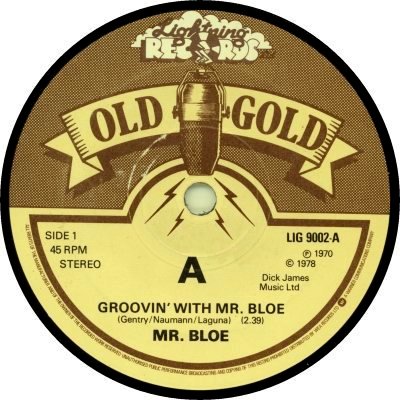
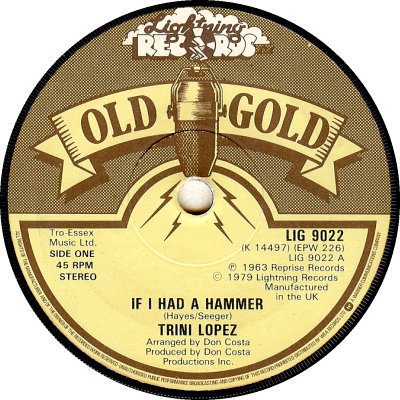
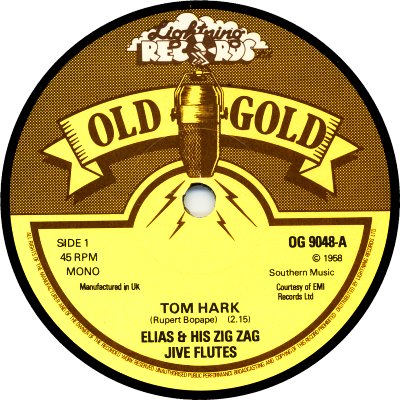
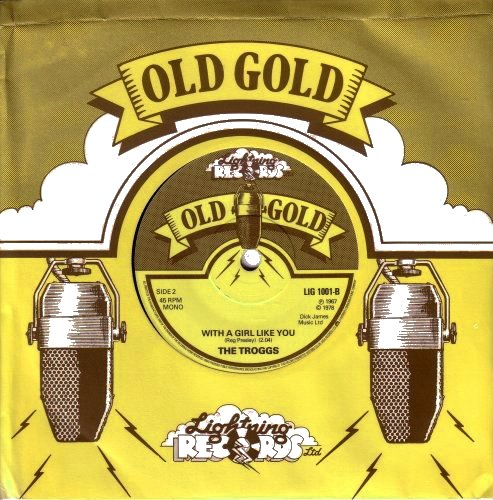
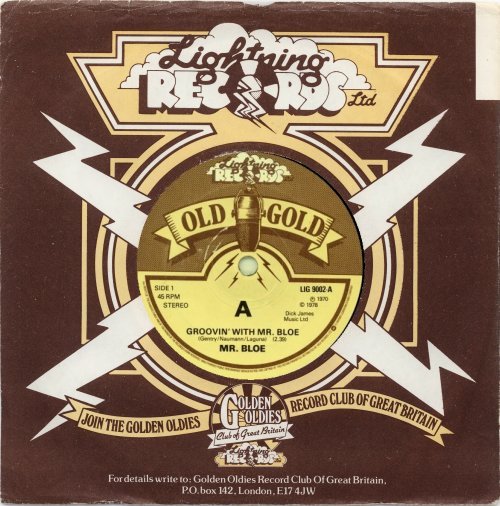
Lightning Records started out as an importer and distributor of Oldies; the 'Old Gold' label was an extension of that business. 'Music Week' of the 19th of November 1977 reported on the company's first attempts to obtain and make available supplies of reissues: according to director Alan Davidson one idea was for majors to re-press oldies with an Old Gold logo on the label and for Lightning to guarantee to buy a set number of copies. While in most cases the company would go for the 'guaranteed initial order' option, in others it hoped to buy the rights to product for two years, exclusively; and it intended to launch an 'oldies' label to go with its 'Lightning' label (q.v.), which was for current material. The plans solidified, and 'MW' of the 14th of January was able to reveal that the first two singles on the new 'golden oldies' label would be 'Wild Thing' by The Troggs and 'Groovin' With Mr. Bloe' by Mr. Bloe; Python Lee Jackson's 'In A Broken Dream' was lined up as the third release. These would be followed by more of the most requested records from Lightning's 'oldies' catalogue. Marketing would be undertaken by WEA, and catalogue numbers would be in a GO-9000 series. The article said that EMI, Decca, Pye and RCA had been reluctant to lease back catalogue items out, but that other companies had been co-operative. One release a month was planned, two if the venture was a success.
When the first singles emerged they were actually numbered in the LIG-1000s. 'Wild Thing' (LIG-1001) came out in March 1978, and 'Groovin' With Mr. Bloe' followed towards the end of April. Their labels had a reference to WEA at 4 o'clock in the perimeter text (1). In May, Decca provided six re-pressings of 'oldies' on a special red label primarily for Lightning ('MW', 6th May 1978), presumably as the fruit of one of those 'guaranteed initial order' arrangements, but there was no reference to Old Gold on the labels; similar pressings were to follow in October, and in August 1979. Likewise, 'MW' of the 27th of May said that Pye had agreed to make special pressings for Lightning to distribute; the following week it revealed that the first three fruits of the deal were to be new couplings of hits by Status Quo, Lonnie Donnegan and Emile Ford & The Checkmates. Again, there was no reference to Old Gold or to Lightning on the labels. The other Pye singles in the block from 7N-46096 to 7N-46107 and 7N-46110 may very well also have been pressed specifically for Lightning; see the 'Pye Discography' page for the titles. To return to Old Gold, there appears to have been a rethink at this point, as a result of which singles started to be released in groups rather than individually. Billboard (22nd July 1978) reported that Lightning was setting up the Golden Oldies Record Club (6) and was issuing its 'first batch' of product. There were ten records in this first batch: they had catalogue numbers in a new series, from LIG-9001 to 9010, and they included a renumbered 'Wild Thing' (LIG-9001) and 'Groovin' With Mr. Bloe' (LIG-9002), which was given a different 'B' side. They were released on the 14th of July ('MW'), and they had a black 'A' on the labels, in line with what seems to have been standard WEA practise at the time (2). 'Baby Come Back' by The Equals (LIG-9021) followed in January 1979, by which point the black 'A' had disappeared (3). The missing numbers, LIG-9011 to 9020, were accounted for in Lightning's next batch of reissues. It came in April 1979 and consisted of ten picture discs featuring Rock 'n' Roll records, which were marketed together as the 'Cruisin' collection (q.v.) and were distinctive enough to deserve their own page on this site. As the picture discs sold out, the records were re-pressed in black vinyl and with paper labels; they kept the same catalogue numbers. A solitary black vinyl single in July of that year, Trini Lopez's 'If I Had A Hammer' (LIG-9022), kept the ball rolling; but not long after that there was another change.
'Music Week' of the 27th of October 1979 carried the news that Old Gold titles would no longer be available through WEA; in future they would be distributed by Lightning themselves and by Spartan (q.v.). The LIG-9000 series was to be changed to OG-9000, and when stocks of existing 'LIG' singles ran out they would be re-pressed with the same numbers but with an 'OG' prefix. There was a minor change to the label design at the same time: the perimeter wording 'Distributed by WEA Records Ltd A Warner Communications company' was replaced by 'Distributed by Lightning Records Ltd' (4). The numerical series was to remain the same, but the design changed several times, far more drastically, in the '80s and '90s. Singles were regularly re-pressed, and the re-pressings were given whatever style of label was current at that time; in combination with the early changes of number, this resulted in records being available under several different guises. For example, 'Wild Thing' can be found as LIG-1001, LIG-9001 and OG-9001, with a variety of labels and made by different manufacturers. Early singles were pressed by CBS, thanks to the WEA connection; by the end of the '70s Multiple Sound Pressings appear to have been doing that job, while Lyntone and Pye were among the manufacturers in the '80s. Old Gold singles covered any number of musical styles and came out at an astonishing rate: OG-9800 was reached in 1988. The label was still in existence well into the CD era. The discography below only covers the 1970s, I'm relieved to say; anybody who is interested in Old Gold can find a pretty full listing, often with examples of different types of the same record, on the 45cat site . Thanks to Robert Bowes for the third scan and for the scan of the second sleeve, which appears to have been short-lived and which advertises LIGs 9001 to 9021; the first sleeve is by far the more common of the two.
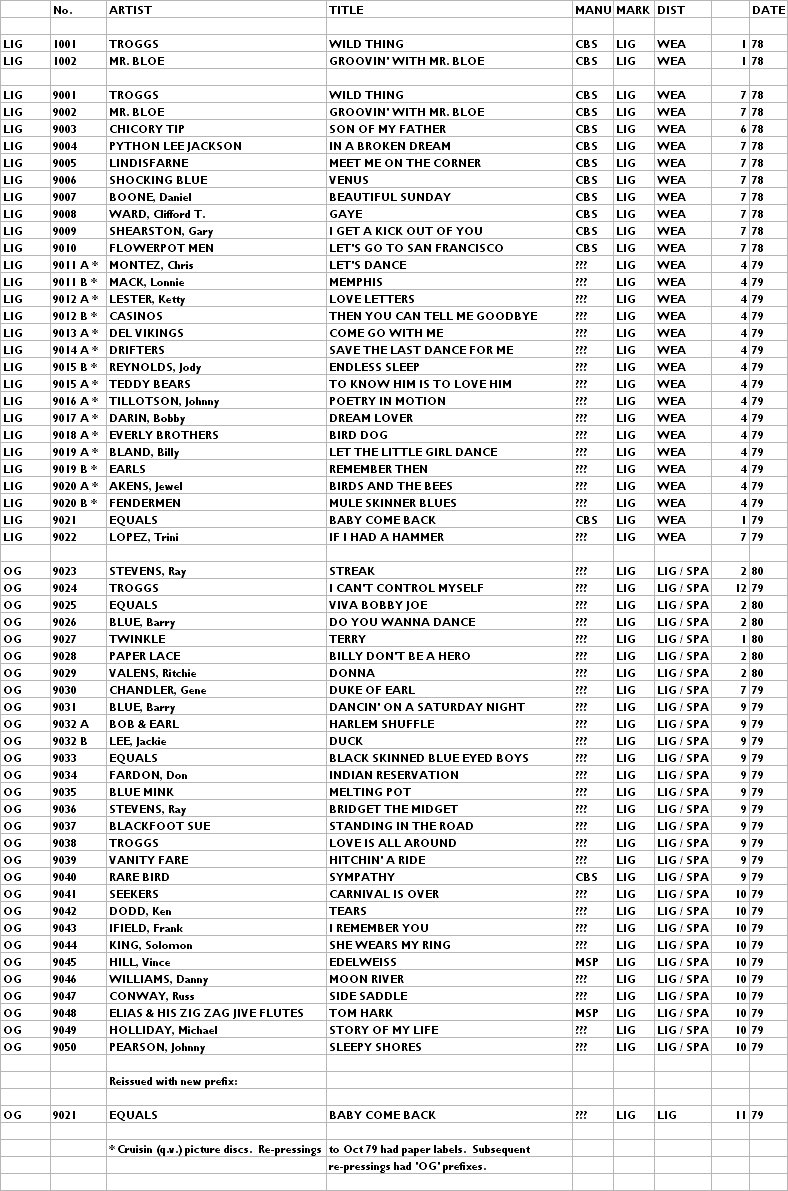


Copyright 2006 Robert Lyons.

